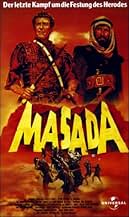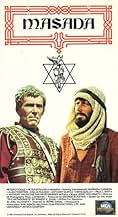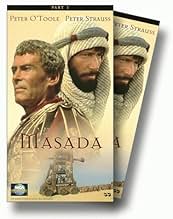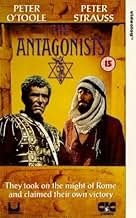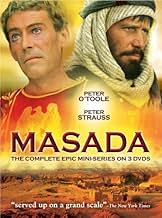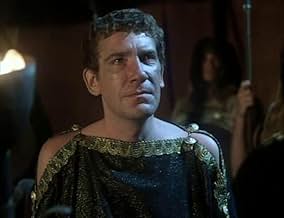Masada
- TV Mini Series
- 1981
- 1h 39m
IMDb RATING
7.8/10
2.6K
YOUR RATING
After the destruction of the Second Temple, nine hundred Jewish zealots hold out against a five thousand man Roman legion on the mountaintop fortress of Masada.After the destruction of the Second Temple, nine hundred Jewish zealots hold out against a five thousand man Roman legion on the mountaintop fortress of Masada.After the destruction of the Second Temple, nine hundred Jewish zealots hold out against a five thousand man Roman legion on the mountaintop fortress of Masada.
- Won 2 Primetime Emmys
- 3 wins & 15 nominations total
Browse episodes
Featured reviews
The movie is based on the book THE ANTAGONISTS and shows the story of the Jewish defense from the Roman oppressor. The story seems to be quite short and not the main focus of the film. Jews led by Eleazar stay in a huge fortress of Masada on the Judean Desert which is their only safe place away from the Roman Empire. Romans are forced to conquer them.
The movie shows human soul, psychological aspect of humanity, even of the "triumphant Roman leaders". This psychological aspect is revealed in both main characters: the Jewish leader Eleazar, portrayed wonderfully by Peter Strauss (one of his really best roles), and Flavius Silva (great Peter O'Toole), the leader of the 10th legion attempting at finishing the conquest and returning to Rome. Both of them are full of doubts. They change over the movie, develop like all of us do.
Silva doubts the logic of the whole campaign, which is especially emphasized at the end when he says desperately "What victory!? We have won a rock on the shore of the poisoned sea!" A rock that has cost thousands of innocent lives. He is also an honorable man. When Pomponius Falco takes over the leadership and occurs to be brutal, Silva tries his best to prove that this way of dealing with the enemy is "not Rome!" He even meets with Eleazar to justify these deeds.
Eleazar is a good Jew. He cares for his people but there is one thing which makes others confused. He doubts in the existence of God. However, deeply in his heart, there is a place for Him. Peter Strauss stresses this memorably when he goes to pray in order the Romans to stop killing the innocent Jews. In fact, he proves to love his people and that is, most appealingly, a better knowledge of God than any other...
The character that needs mentioning is Sheva (Barbara Carrera). She, in fact, is not very sure if she loves Silva or not. On the one hand, she wants to stay with him. On the other hand, her people seem to be more important. Finally, she decides to leave him. Her love is divided and demands a difficult choice. VERY PSYCHOLOGICAL!
In this comment I concentrated mostly on the psychological aspect. Yes, I admit that it appears to be the most significant factor for me. There are, of course, other factors that make me love this movie: the whole story, the locations, the music, the stars... EVERYTHING! But you will have a chance to appreciate all these aspects when you decide to see MASADA.
Finally, the end is unforgettable: "Take them their victory! Then they will remember..." Truly impressive script! One of the best lessons of life! 10/10 for the whole movie!
The final reference to modern Israel appears to be particularly touching!
YES, WE REMEMBER MASADA AND THE GROUP OF BRAVE PEOPLE WHO WERE NOT AFRAID TO REMAIN THEMSELVES AND RETAIN THEIR DIGNITY.
The movie shows human soul, psychological aspect of humanity, even of the "triumphant Roman leaders". This psychological aspect is revealed in both main characters: the Jewish leader Eleazar, portrayed wonderfully by Peter Strauss (one of his really best roles), and Flavius Silva (great Peter O'Toole), the leader of the 10th legion attempting at finishing the conquest and returning to Rome. Both of them are full of doubts. They change over the movie, develop like all of us do.
Silva doubts the logic of the whole campaign, which is especially emphasized at the end when he says desperately "What victory!? We have won a rock on the shore of the poisoned sea!" A rock that has cost thousands of innocent lives. He is also an honorable man. When Pomponius Falco takes over the leadership and occurs to be brutal, Silva tries his best to prove that this way of dealing with the enemy is "not Rome!" He even meets with Eleazar to justify these deeds.
Eleazar is a good Jew. He cares for his people but there is one thing which makes others confused. He doubts in the existence of God. However, deeply in his heart, there is a place for Him. Peter Strauss stresses this memorably when he goes to pray in order the Romans to stop killing the innocent Jews. In fact, he proves to love his people and that is, most appealingly, a better knowledge of God than any other...
The character that needs mentioning is Sheva (Barbara Carrera). She, in fact, is not very sure if she loves Silva or not. On the one hand, she wants to stay with him. On the other hand, her people seem to be more important. Finally, she decides to leave him. Her love is divided and demands a difficult choice. VERY PSYCHOLOGICAL!
In this comment I concentrated mostly on the psychological aspect. Yes, I admit that it appears to be the most significant factor for me. There are, of course, other factors that make me love this movie: the whole story, the locations, the music, the stars... EVERYTHING! But you will have a chance to appreciate all these aspects when you decide to see MASADA.
Finally, the end is unforgettable: "Take them their victory! Then they will remember..." Truly impressive script! One of the best lessons of life! 10/10 for the whole movie!
The final reference to modern Israel appears to be particularly touching!
YES, WE REMEMBER MASADA AND THE GROUP OF BRAVE PEOPLE WHO WERE NOT AFRAID TO REMAIN THEMSELVES AND RETAIN THEIR DIGNITY.
This is quite simply one of the grandest epics you can see. I first saw this on TV when I was young. Every night it was on I was glued to the TV, completely enthralled by the story. When I finally got the multi-tape set recently, I wasn't sure if I would still be affected the same now that I am older, but it was everything I remember. Fabulous story. Fabulous actors.Incredibly moving musical score. Incredibly realistic set because it was actually filmed at Masada. The whole thing was just breath-taking. And the story is so powerful it will have you walking around for days just weeping from the emotions it brings out. If you can find the 6 1/2 hours to sit down and watch it in one sitting, you will not be disappointed.
This story brings out the idealist and the need for faith in me whenever I view it. The historical accuracy and the sheer information provided about the Roman Empire, the province of Judea circa 70AD, and the Roman Legions, are truly astonishing. Every semester, whenever I teach World Civilizations I at Essex County College in Newark NJ, I always include a classroom viewing of the 2 hour version for my students (and lament not time enough to show the full saga). Peter O'Toole's performance as the competant but troubled Flavius Silva I humbly believe is his masterwork and the life he places in his character is thought provoking and emotionally stirring. The music, the material, the true story and the detail from building the ramp to the costumes and location re-create what actually happened better than any textbook or lecture could. By the way, Barbara Cararra almost steals the show from Peter O'Toole and her acting performance also deserves special mention. I proudly own the full saga on VHS and eagerly await the DVD edition. This is a must-see for anyone interested in Roman, Israeli, or general history.
10Gunn
Masada is amazing, in part, because it is a true story and also because it is truly a fascinating drama. Originally filmed as a mini-series, at 6 plus hours, it has been released in short (movie length) form but don't bother with that edition. Even though it (the six hour video set) is quite long, not one minute will bore you. It is a story of the military...in a battle of wits against (Jewish) patriots. The cast is superb, with Americans playing the Jews and British actors as the Romans. The lowly soldiers speaking in "middle class" dialect while the officers sound more aristocratic...a really nice touch. Peter O'Toole has never been better in his role as Flavius Silva commander of the Roman regiment dispatched by Rome to capture the Jews holding out at Masada...a huge, almost impregnable mountain fortress. Anthony Quayle and David Warner also do some of their best work ever. Peter Straus as Eleazar, leader of the Jews is passionate in his convictions and the rest of the cast shines also. The mind games they utilize on each other are fascinating and make for engrossing drama. It is truly one of the best mini-series, or historical epics ever put to film. The newly released 4 video set consists of 90 mins. per video so one can enjoy Masada over four evenings. Note: As of 2007 it is now available on DVD. The viewer will feel it is time well spent.
Peter O'Toole (who starred in another great desert epic, Lawrence of Arabia) is wonderful as the general who knows peaceful negotiation is better than war, but is forced by political wrangling above and below his rank to try to crush the Jewish resistance group. The Romans learn that it is one thing to conquer a country, but it's altogether another thing to occupy it. And don't we still see that to the current day? In another telling analogy, if it considered valiant to kill yourself (& family) just to defy your enemy, what does that say about modern suicide bombers? I recall a bit of controversy when this film came out. Some critics worried that the mass suicide at Masada was too evocative of Jim Jones' cult suicide in Guyana.
There's lots of interesting historical detail about ancient social classes, technology, military strategy - even an example of early political satire shows! This is not just "Hollywood spectacle". The characters are realistically portrayed going through real human struggles. As I recall, the sole historical account of Masada comes from Josephus, a Jew serving Emperor Vespacian. Josephus supposedly got the inside story from one of the few Jews who didn't commit suicide. Therefore, 80% of the film and most of the characters are probably fictional, created to add drama. Even so, everything supports the main story and brings the event to life. The only bit that is too exaggerated is the opening credits in the first part, set in the present day, which comes across like nothing less than an advertisement for the Israeli army.
Oh, and the musical score is fabulous! I remember faith-healer and Christian evangelist Maurice Cerullo had a massive fund-raising campaign to help produce this film. For an adequate donation you got a commemorative bronze movie medallion.
There's lots of interesting historical detail about ancient social classes, technology, military strategy - even an example of early political satire shows! This is not just "Hollywood spectacle". The characters are realistically portrayed going through real human struggles. As I recall, the sole historical account of Masada comes from Josephus, a Jew serving Emperor Vespacian. Josephus supposedly got the inside story from one of the few Jews who didn't commit suicide. Therefore, 80% of the film and most of the characters are probably fictional, created to add drama. Even so, everything supports the main story and brings the event to life. The only bit that is too exaggerated is the opening credits in the first part, set in the present day, which comes across like nothing less than an advertisement for the Israeli army.
Oh, and the musical score is fabulous! I remember faith-healer and Christian evangelist Maurice Cerullo had a massive fund-raising campaign to help produce this film. For an adequate donation you got a commemorative bronze movie medallion.
Did you know
- TriviaIn his opening monologue on April 7, 1981, Johnny Carson described this mini-series as a "Kosher Shogun". After watching the mini-series, Carson joked that he learned all Romans spoke with an English accent.
- GoofsDuring the scene in which the Jews are ascending the trail up to the summit of Masada, a vehicle the size of a bus can clearly be seen travelling on a road in the background
- Quotes
Cornelius Flavius Silva: A victory? What have we won? We've won a rock in the middle of a wasteland, on the shores of a poisoned sea.
- Alternate versionsAn extremely edited, two-hour version was released on video c. 1982.
- ConnectionsFeatured in The 33rd Annual Primetime Emmy Awards (1981)
- How many seasons does Masada have?Powered by Alexa
Details
Contribute to this page
Suggest an edit or add missing content


